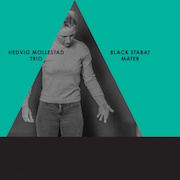Comparing musicians to forces of nature is often the first refuge of the uninspired, but it’s difficult to know how else to describe Hedvig Mollestad Thomassen. There’s something elemental about her guitar playing, the way it weaves and swoops between the bass of Ellen Brekken and the drums of Ivar Loe Bjørnstad, creating sonic currents and eddies in the air as she passes through. Just listen to the way she lazily dive-bombs her way through the insistent, rolling rhythms of Black Stabat Mater’s opening track ‘Approaching’ – she’s part Norwegian jazz master Terje Rypdal, part discursive blues rock god Jimi Hendrix. Whereas much of previous album Enfant Terrible felt like a soundtrack to gigantic monoliths been dragged through an inhospitable landscape, this is like soaring effortlessly above such human struggles.
And then just as we’re settling in for the ride, Mollestad hits the accelerator, the band locking into a straighter rock beat as she flings out a series of fast riffs in the tradition of both 80s NWOBHM and 70s Euro prog. For all the Trio’s jazz credentials, you can’t imagine this going down too well at Ronnie Scott’s. In fact, this feels like the album where they definitively shift from being a jazz band that plays rock to being a rock band that plays, well, rock, albeit rock with a healthy sense of adventure. Oh, and fun, by which I mean being able to transmit the exhilaration of technique, possessing the ability to do something that seems faintly astonishing to the rest of us, but without the stuffy wankiness that’s the usual by-product of such proficiency.
However, you can take that smile off your face, because here comes ‘On Arrival’, and it looks like our destination is a particularly bombed out quarter of hell. Everything clangs grimly and slowly, like News At Ten at the end of the world. There’s a grudging, gradual shift of chords, and then Mollestad starts to assert her dominance, her guitar wailing and tortured, no longer a woman-machine interface, but something inhuman. It’s a free jazz mentality applied to rock, but not in the usual half-arsed way of such things – this is a tightly-coiled storm of string-generated electronics that Bjørnstad chisels away at with a succession of maniacal blast beats.
As its title suggests, ‘In The Court Of The Trolls’ pays homage to the heavy avant prog of King Crimson, its relentless, twisting riff owing much to Robert Fripp at his gnarliest. It’s also a showcase for the band’s battle-hardened live power, their performance here triggering something primal in the backbrain, its central theme grabbing at your limbs, even as it remains bound to a stake in the ground. When Mollestad finally pulls free to solo, she follows a compass only she can understand, intent on taking us to a strange new place whether we like it or not.
‘40’ is based around some Slint-esque minor key picking, uncertain and slippery, but again, content to sit on the same theme without intemperately dashing off. There’s a natural build-up of ambience, which culminates in what sounds like the laughter of mechanical crows and the deep foghorn of a cello. The album then closes with ‘Somebody Else Should Be On That Bus’ and another grinding Crimson-u-like riff from Brekken, rapidly establishing herself as the John Wetton of stand-up bass. The drums come lolloping in, and then Mollestad descends from the heavens, fierier than ever, leaving scorch marks on the earth. She builds to full-on shriek before bolstering the main riff, with proceedings ending on a strangely angry note.
At just 33 minutes, Black Stabat Mater is a commendably compact and condensed slab of heavy riffage and guitar concrète, both devastating and eerie. (Though if you can’t get enough HMT, there’s a live album – Evil In Oslo – being released in tandem with BSM that even the usually sedate Rune Grammofon are moved to describe as “kick ass.”)


